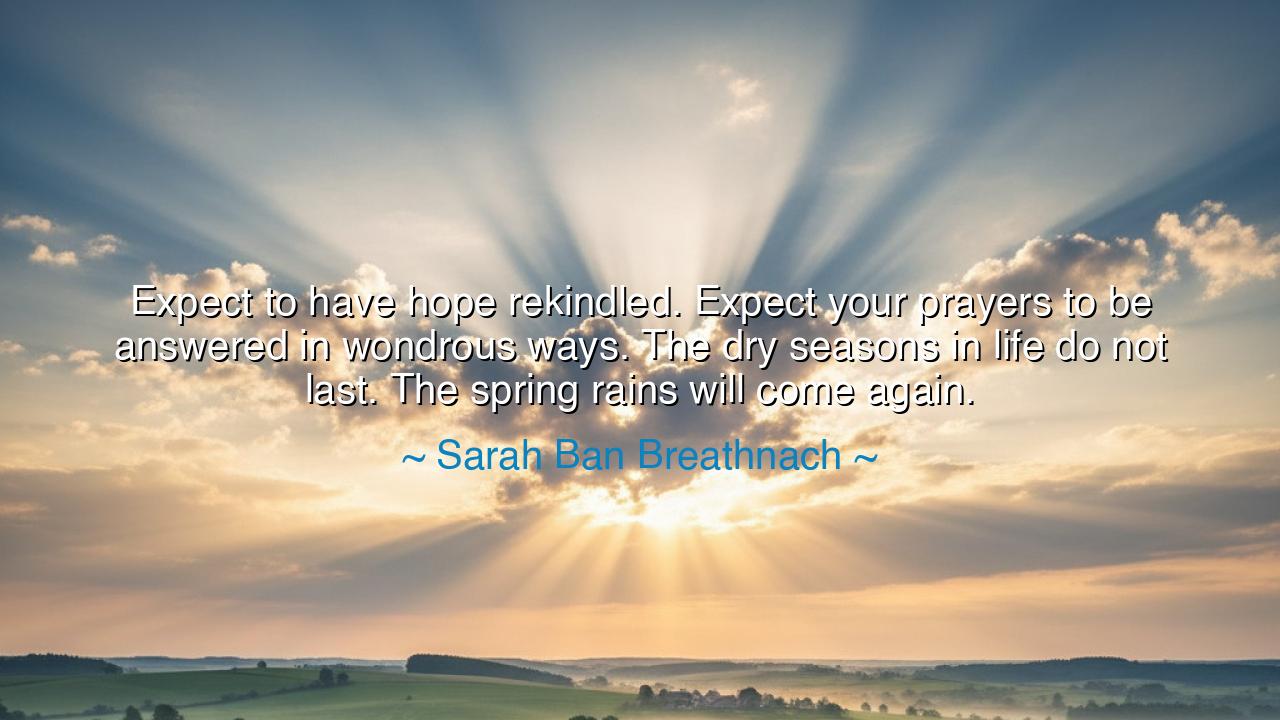
Expect to have hope rekindled. Expect your prayers to be answered
Expect to have hope rekindled. Expect your prayers to be answered in wondrous ways. The dry seasons in life do not last. The spring rains will come again.






The words of Sarah Ban Breathnach, “Expect to have hope rekindled. Expect your prayers to be answered in wondrous ways. The dry seasons in life do not last. The spring rains will come again,” speak with the serene wisdom of one who has endured despair and lived to see its transformation. These are not the words of naive optimism, but of faith tested by fire — a reminder that even in life’s most barren seasons, something sacred is still at work beneath the surface. Breathnach’s vision is both tender and powerful: a promise that renewal is part of the natural order, that no heart remains winter-bound forever.
To the ancients, such wisdom would have been understood as a law of the cosmos. They saw the seasons of the soul mirrored in the turning of the earth — birth, growth, decay, and rebirth. The farmer did not curse the dry soil, for he knew that rain would come; the sailor did not abandon the sea when storms arose, for he trusted that the winds would change. Likewise, Breathnach urges us to expect the return of hope — not merely to wish for it, but to hold it as a certainty written into the rhythm of life itself. For despair is only the shadow cast by transformation in progress. The soul, like the earth, needs its winter so that its spring might come forth anew.
Her words also carry the essence of prayer — not as superstition, but as an act of deep alignment between human longing and divine timing. “Expect your prayers to be answered in wondrous ways,” she writes, and in this she teaches a subtle truth: that the answers may not come as we imagine them, but they come nonetheless. The ancients believed that the gods spoke in unexpected forms — through storms, strangers, dreams. Breathnach’s wisdom revives that faith, reminding us that the universe answers every earnest plea, though often not in the language we expect. What matters is to remain open and expectant, for expectation itself keeps the lamp of hope burning through the night.
Consider the story of Nelson Mandela, who spent twenty-seven years in the harsh confines of Robben Island. His life became the embodiment of the “dry season” — years stripped of freedom, sunlight, and comfort. Yet even in prison, Mandela tended to the garden of his spirit. He read, he taught, he forgave. He believed, quietly but steadfastly, that one day the spring rains would come again. And they did — not only for him, but for an entire nation. His story is a living testimony to Breathnach’s truth: that no winter endures forever, and that patience joined with faith can turn even desolation into renewal.
There is another lesson here — one that speaks to the weary and the waiting. Breathnach does not merely say “hope will return,” but “expect” it. Expectation is active, not passive; it is the posture of those who still believe even when belief feels impossible. To expect renewal is to water the seeds of tomorrow while today’s ground is still dry. It is to act as though the light will return, and in that action, help to summon it. Hope rekindles itself through movement — through one prayer whispered, one kindness offered, one breath of gratitude drawn even in sorrow.
The ancients would have called this faith in divine rhythm — the unbreakable cycle of loss and restoration that governs both nature and spirit. To live by this rhythm is to walk in harmony with life’s mysteries rather than in resistance to them. For despair comes not from hardship itself, but from forgetting that hardship is temporary. As the desert yields to rain, so the hardened heart softens when touched by time and grace. Breathnach’s wisdom, therefore, is a song of patience — not the patience of waiting idly, but of trusting actively, keeping one’s inner fire alive until the dawn breaks.
So, my listener, take this truth into your soul: your dry seasons are not your end. They are your preparation — the silent labor of life reshaping you for what is to come. Do not curse the barrenness; nurture your faith within it. Pray, even when the heavens seem still. Expect, even when you cannot yet see. And when the spring rains finally fall — as they surely will — lift your face to the sky and remember that you endured. For as Sarah Ban Breathnach teaches, hope is not a frail wish but a living force, one that sleeps only to awaken stronger, like the earth after a long winter’s rest.
And thus, let your heart live by the seasons: patient in drought, humble in rain, steadfast in both. For the rhythm of life is this — the loss that teaches gratitude, the silence that deepens prayer, and the renewal that always, always comes again.






AAdministratorAdministrator
Welcome, honored guests. Please leave a comment, we will respond soon